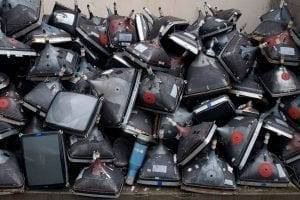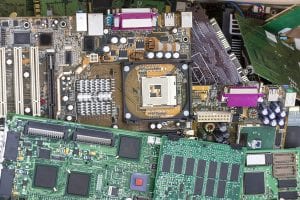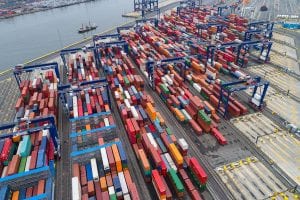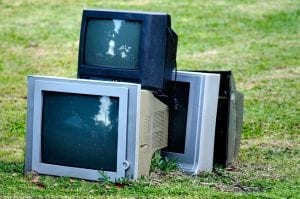 Electronics manufacturers are proposing a nationwide point-of-sale fee to fund recycling of CRT devices, an industry group announced last week.
Electronics manufacturers are proposing a nationwide point-of-sale fee to fund recycling of CRT devices, an industry group announced last week.

E-Scrap News magazine is the premier trade journal for electronics recycling and refurbishment experts. It offers updates on the latest equipment and technology, details trends in electronics recycling legislation, highlights the work of innovative processors, and covers all the other critical industry news.
Sign up for our free weekly e-newsletters to receive the latest news directly.
 Electronics manufacturers are proposing a nationwide point-of-sale fee to fund recycling of CRT devices, an industry group announced last week.
Electronics manufacturers are proposing a nationwide point-of-sale fee to fund recycling of CRT devices, an industry group announced last week.
3R Technology of Seattle; Augusta Data Storage of Augusta, Ga.; International Data Depository of Miami; ITEC of Santa Ana, Calif.; Land Shark Shredding of Bowling Green, Ky.; Office Shredding of Hyattsville, Md. and Southern California Shredding of Lake Forest, Calif. have either achieved or renewed their NAID certifications for physical destruction of hard drives.
Also, ERI of Flower Mound, Texas has renewed its NAID certification for hard drive sanitization and physical destruction of hard drives.
Sims Recycling Solutions (SRS) achieved ISO 27001:2013 certification at its Roseville, Calif. and West Chicago, Ill. facilities.
Visit our archive to view previous editions of the scorecard.
 At the Electronics Reuse Conference this week, a number of speakers delivered practical tools and tips that can help refurb operations boost efficiency and profitability.
At the Electronics Reuse Conference this week, a number of speakers delivered practical tools and tips that can help refurb operations boost efficiency and profitability.

The federal government will continue to allow the unlocking of mobile devices so they can be resold at higher values. The Library of Congress also expanded the list of items that can be unlocked.
 The total weight processed by Sims Recycling Solutions went down last year, likely the result of a changing electronics stream and shifting business focus, an executive said.
The total weight processed by Sims Recycling Solutions went down last year, likely the result of a changing electronics stream and shifting business focus, an executive said.
 Federal regulators are considering a proposal to ban exports of unprocessed e-scrap and require stringent tracking procedures for exports that are still allowed.
Federal regulators are considering a proposal to ban exports of unprocessed e-scrap and require stringent tracking procedures for exports that are still allowed.
Sustainable Electronics Recycling International (SERI) has a newly hired R2 director who brings with him extensive experience supporting Canadian electronics stewardship and certification programs.
AccuShred of Toledo, Ohio; Confidential On-Site Paper Shredding (COPS) of Normal, Ill.; Fireproof Records Center of Columbus, Ohio; Infoshred of East Windsor, Conn.; M1 Document Solutions of County Monaghan, Ireland; RDN of Arecibo, Puerto Rico; River City Shredding of Chattanooga, Tenn.; Secure Document Solutions of Independence, Mo.; Security Mobile Shredding of Alexandria, La. and Total Destruction of Alamogordo, N.M. have either achieved or renewed their NAID certifications for physical destruction of hard drives.
Also, Stallard Technologies of Overland Park, Kan. has renewed its NAID certifications for hard drive sanitization and physical destruction of hard drives.
PC Survivors of Massachusetts of Hanover, Mass. has renewed its R2:2013 and RIOS:2016 certifications.
Visit our archive to view previous editions of the scorecard.
 Federal charges have been filed against the owner of an Iowa e-scrap company, marking the latest of several legal cases related to the company’s alleged improper storage of CRTs and other e-scrap.
Federal charges have been filed against the owner of an Iowa e-scrap company, marking the latest of several legal cases related to the company’s alleged improper storage of CRTs and other e-scrap.
 Canada’s CBC News recently broadcast an in-depth documentary alleging Apple works to thwart independent repair and pushes customers to replace, not fix, devices.
Canada’s CBC News recently broadcast an in-depth documentary alleging Apple works to thwart independent repair and pushes customers to replace, not fix, devices.
